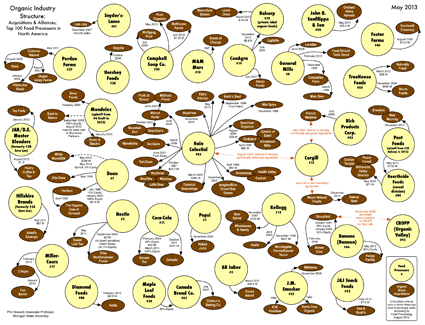Organic Egg Scorecard Criteria
There is a huge fight going on in organics.
As of 2012, Organic Trade Association reports that Canada's organic products market is worth $3.7 Billion, of which $2.98 Billion is for organic food and beverage (excluding alcoholic beverages).
Like a ripe cow pattie attracting flies, $3.7 Billion attracts a multitude of flies too. For example, in the USA over 80% of "organic" eggs are sold by Big Food and the #EggMafia.
In 2012, organic food had only 1.7% market share, but it's growing each year (20%/yr growth on average for the last 6 years, for a total of 300% increase since 2006). Canadians buy 45% of these organics from mainstream retail stores (eg. grocery stores, malls, big box, etc.). For all Canadians, 58% of these families buy organic products every week. In some segments, it's as high as 67% non-Caucasians, 66% BC residents, 63% of residents in major cities, and 62% of families with children under 2 yrs. old, 62% of 35-44 yrs olds, and 61% of university graduates.
For the average Canadian organic shopper, they spend 39% of their weekly grocery shopping budget ($51.75/wk.) on organics, which ended up costing them an extra $17.50 per week vs. those who don't buy organics. At 35 Million Canadians, an average family size of 3, that organic market is worth $10.6 Billion sales premium for Big Food.
Anybody who stand in Big Food's way at getting this extra $10.6 Billion will be run over with vengeance by the Big Food steamroller.
 |
| Who owns "Organic"? Organic Industry Structure, Acquisitions & Alliances, Top 100 Food Processors in North America Full size version of chart |
The chart at the right shows the scramble of Big Food to buy up everything that gives them an entry into the organic market. Big Food has invaded and captured the organic market.
Organic eggs has grown from $15.8 Million sales in 2008 to $21.6 Million in 2012 for an average growth rate of 6.83%/yr.
Of the 3,000 organic products sold in Canada, 43% of those products originate from within Canada, 30% come from USA, and 19% come from parts unknown.
For all these organic products, are they really organic, or do they just say that, and hope you won't really notice the difference, or care to check.
In the US, the package has to say "Organic USDA" or it is a fake. Many products have added "Natural" to their label, which means nothing whatsoever; just marketing hype. Unfortunately, most consumers mistakenly assume that "natural" is the same as "organic"; but that couldn't be further from the truth.
Even those packages that say they are 100% organic may not be truly organic. For example, hexane is usually used to extract the oil out of soybeans to create soybean meal, one of the main constituents of animal feeds.
I used to work in a petrochemical factory that used hexane as a solvent in huge reactors to make polyethylene plastics. Hexane is one of the major ingredients in gasoline. Our chemical plant workers had to be careful with getting too much hexane on themselves, especially their hands, as it would cause permanent nerve damage. I'm sure when they do the soybean extraction they try to get most of the hexane out before they package it as human or animal feed. Don't you think? We'll never know for sure until it's too late.
In the video above, you can see some of the tricks that Big Food and the Egg Mafia use to try and skirt around the organic certification regulations. Is it any different in Canada? I don't know, but I'm sure some of you out there do, so the comments section below this posting are open, by name or anonymous, as you prefer.
If someone cheats, it hurts the brand "organic", and financially weakens those who truly follow the organic certification rules. You get what you pay for. Buyer beware.
Know where your food comes from, organic or not.

This, indeed, is appalling! Lately, my family has been diverging from all box-store produce, whether organic or not, and towards farm markets and individual farm stands. Yesterday, we met our future egg and chicken producers- Mel and Walter- whose sustainable farming practices were evident upon the first visit. Next year, we are hoping to set up our own little garden. Self-sufficiency (at least, on the community level) is the way to go!
ReplyDeleteThanks for your comment, and sharing your personal info.
DeleteIf "regular" food is unaffordable for many, how will these people afford the higher priced "organic" version?
While many support organic, from what I understand, this is not a guarantee of safe, nutritious, affordable food. For example, are the hybrids of today as nutritious as those of 1940? I have yet to see those type of stats on seed catalogues.
The similar difficulty occurs with breeding and genetic selection for rapid growth poultry. Does it produce the same Omega-3 to Omega-6 ratio as what heirloom breeds do? Are there other significant differences in the nutritional makeup of the resulting eggs and meat?
Glenn Black
Small Flock Poultry Farmers of Canada